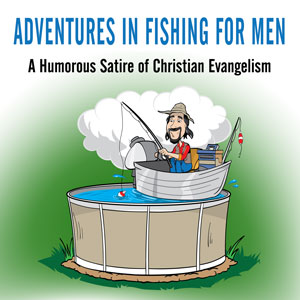Below is an excerpt from a book I’m writing called Adventures in Fishing (for Men). The book is a satirical allegory about Christian attempts at evangelism. He who has ears to hear…
Fishermen are not as smart as they once were. Over the past fifty years, fisherman have been “dumbing down.” I blame the television.
 To counteract this increasing ignorance, it is critical for fisherman to learn to talk like a fisherman. True fishermen know all the big fisherman words, and can casually throw fishing lingo into any conversation. As I started attending the fishing club every week, I quickly learned how little I knew about fishing.
To counteract this increasing ignorance, it is critical for fisherman to learn to talk like a fisherman. True fishermen know all the big fisherman words, and can casually throw fishing lingo into any conversation. As I started attending the fishing club every week, I quickly learned how little I knew about fishing.
During the weekly fishing lectures, and in conversations with other members after the meetings, I found myself in awe at all the big fishing terms that people threw around which I did not know. There was talk about dispenfishionalist fishcatology, angler awareness, covenants of fishing, efishiency quotient, the hydrostatic union, filioquota, and numerous other terms I didn’t understand.
And it wasn’t just the lingo. There were debates about which types of hooks were approved by God, how old a person could be before they went fishing, whether or not women could fish, and whether or not fishing could be done with rubber worms. Clearly, I had much to learn.
So the next day I went down to the local fishing bookstore and asked for some books on systematic fishology. The clerk led me over to an isle filled with hundreds of giant volumes.
“Is there a particular book you are looking for?” he asked.
I panicked. If I didn’t sound smart, he would know that I was an amateur fisherman who was just trying to learn the lingo. So I blurted out a line I had heard someone say from the conference.
“Yes, I want to learn about pneumatologically participatory martyrological fishcatology.” I had no clue what this meant, but apparently he didn’t either, because he turned to scan the rows of books, while stroking his chin and trying to look smart. Finally, he pulled a few books from the shelves and handed them to me. They were some of the smaller volumes, and most of them were in paperback.
 “I think these are a little too basic for me,” I said. I couldn’t understand the title on most of the books, but that didn’t matter. I wanted him to know that I was serious about learning my fishing lingo. I pointed to a set of books near the end of the row which had boring brown covers. There must have been ten or fifteen books in the set, and they had the word “Dogmatics” on the spine. “I don’t own a fishing dog, but I am going to get one, and I think that set would be helpful in training him to fish.”
“I think these are a little too basic for me,” I said. I couldn’t understand the title on most of the books, but that didn’t matter. I wanted him to know that I was serious about learning my fishing lingo. I pointed to a set of books near the end of the row which had boring brown covers. There must have been ten or fifteen books in the set, and they had the word “Dogmatics” on the spine. “I don’t own a fishing dog, but I am going to get one, and I think that set would be helpful in training him to fish.”
The bookstore employee just laughed. I had no idea what he was laughing about, so I laughed too. I picked up one of the volumes and thumbed through it. The print was incredibly small and looked terribly dull. I really had no plans of getting a fishing dog. I wasn’t even sure that dogs could fish. But apparently it could be done, and based on the length of the set, training a dog to fish must be quite difficult to do.
“Yep, this is the set for me,” I said, and loaded it into my cart.
On the way up to the check-out counter, I noticed an isle filled with colorful fishing statues, some fancy fishing pens, and even some small vials of “Miraculous Fishing Oil.” I grabbed several of each item. Those fishing pens would come in handy when I recorded the number and size of all the fish I caught. And I wasn’t sure what miraculous fishing oil would do, but it sounded like a good way to catch more fish. At the check-out counter, there were some refrigerator fishing magnets and some fishing greeting cards. I bought several of these too.
When I got home, I put the magnets on my refrigerator, the pens, cards, and oil on my counter, and the statues and books on my shelf. Wow, they looked nice. Very impressive. I was truly on my way to becoming a great fisherman.
Did you want to learn about evangelism through humor?
 Join my discipleship group and take the course which is related to this book.
When you take this course, you will also gain background information about each chapter in the book, as well as some discussion questions to help you think through the content of the chapters.
If you just want to buy the book, you can get it on Amazon here.
Join my discipleship group and take the course which is related to this book.
When you take this course, you will also gain background information about each chapter in the book, as well as some discussion questions to help you think through the content of the chapters.
If you just want to buy the book, you can get it on Amazon here.




Leave a Comment or Question